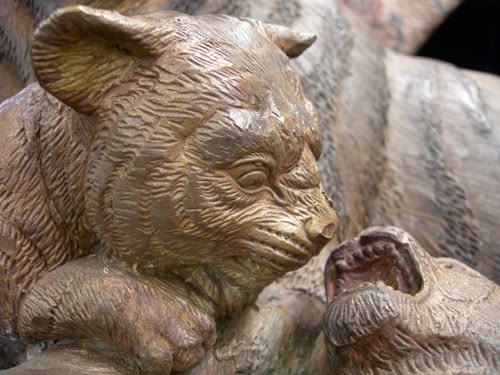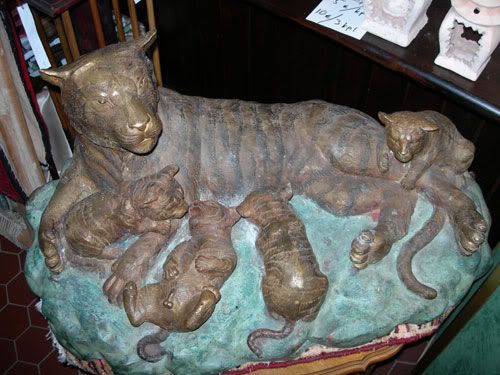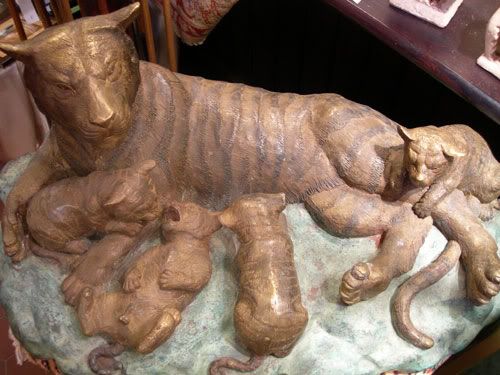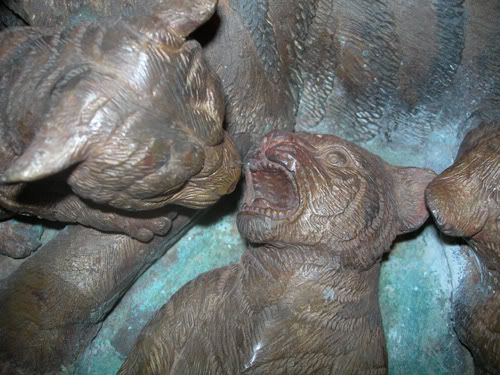
 |
|
|
#1 |
|
Member
Join Date: Apr 2008
Posts: 235
|
Greetings,
 whilst this item is not exactly related to kerises I thought maybe this is the most appropriate place to put this thread(?) as it is kinda related (at least in my own mind) anyhow  Please let me explain. I would like to display a keris in my study room. I have thought of placing it onto an appropriate ploncon. Whilst at it I thought I could make some changes to the room itself and though about placing this statue near the keris. - Whilst the tiger might not be the most look up upon animal on the Indonesian archipelago I like the statue, so... I dont know the origins of this statue but I do know that it is at least a few decades old and most probably from somewhere Asia. - A broad description, yes, but unfortunately the best I can give. It is made of bronze; the size is apr. 100cm x 50cm x 30cm and unfortunately there are no markings whatsoever to be found anywhere.   As many of you are on the know about Asian art and craft I would kindly ask you to give your opinion on the origin and age of this statue. I dont have a clue but would like to know more. I´ve never seen anything like it before.    Thanks, Jussi |
|
|

|
|
|
#2 |
|
Vikingsword Staff
Join Date: Nov 2004
Posts: 6,293
|
I'd suggest Japanese, early to mid 20th C. Jussi .
Most of these are signed and very darkly patinated; that puzzles me a bit . Lynx below,  http://www.jcollector.com/PhotoGalle...ctCode=JP9M819 http://www.jcollector.com/PhotoGalle...ctCode=JM8X172 |
|
|

|
|
|
#3 |
|
Member
Join Date: Aug 2005
Location: Australia
Posts: 371
|
Hi Jussi
I'm with Rick on this, Meiji era Japanese would be my guess. Most but not all of these will be signed, usually on the bottom of the piece, but in some cases the signature will be tucked away almost disguised in the fur or similar. The lack of dark patina may be a function of overzealous cleaning. cheers David |
|
|

|
|
|
#4 |
|
Member
Join Date: May 2006
Posts: 6,896
|
You blokes are better than me on this.
I expect to see Japanese bronzes with that beautiful dark patina. When I look at this one I am reminded of nothing so much as a some Russian and German woodcarvings I have seen --- actually I own the German one.To my eye, the execution just does not look like the Japanese bronzes I have seen. For you to be able to see through the lack of patina and still feel confident with a Japanese origin beats me hands down. |
|
|

|
|
|
#5 |
|
Vikingsword Staff
Join Date: Nov 2004
Posts: 6,293
|
No Alan, you have a very valid point .
I believe I spoke too soon; having one of the Japanese Bronzes myself . After some reflection I doubted my conclusion due to the abundant working of the surface of this sculpture to represent the coats of these animals . That effect does not quite match the Japanese style of these tigers . My bronze tiger is anatomically correct; the genitalia shown on this cub are quite exagerrated compared to my Japanese rendition of the adult Male. I plead nolo . 
|
|
|

|
|
|
#6 |
|
Member
Join Date: May 2006
Posts: 6,896
|
Rick, I'm not backing a German nor a Russian origin, I'm just saying it looks like some things of this origin I have seen.
I don't know enough about this sort of stuff to back anything. As far as I'm concerned it could be from anywhere. |
|
|

|
|
|
#7 |
|
Member
Join Date: Apr 2008
Posts: 235
|
Very good observations gentlemen,
I agree on that the finish does not necessarily match that seen on most Japanese artifacts. It is too detailed for that as the Japanese work tends to be more smooth and "graphic" for a lack of a better word. If I would have to guess I would guess that it is Russian sculpture with Japanese influences. Dont have anything to back this up but the geography - Finland has 1300 km borderline with Russia - raises the odds considerably. Might be German too as Alan suggested. I simply dont know  J |
|
|

|
|
|
#8 |
|
Member
Join Date: Aug 2005
Location: Australia
Posts: 371
|
Alan and Jussi
I certainly see your points on patina and quality, it is the grouping that made me think Japanese. However as Jussi suggests this may well be a Japanese influenced Euro made piece, there was a significant move to Japonism in Europe as a consequence of the many 'Exhibitions/Fairs' that were popular late in the 19th Century, as I am sure you all know. David ps Rick I am not sure the Japanese were always anatomically accurate when it came to 'endowment' if you have seen any shunga prints 
|
|
|

|
|
|
#9 |
|
Vikingsword Staff
Join Date: Nov 2004
Posts: 6,293
|
LOL !
I don't collect Japanese art; but I can imagine .. 
|
|
|

|
 |
|
|